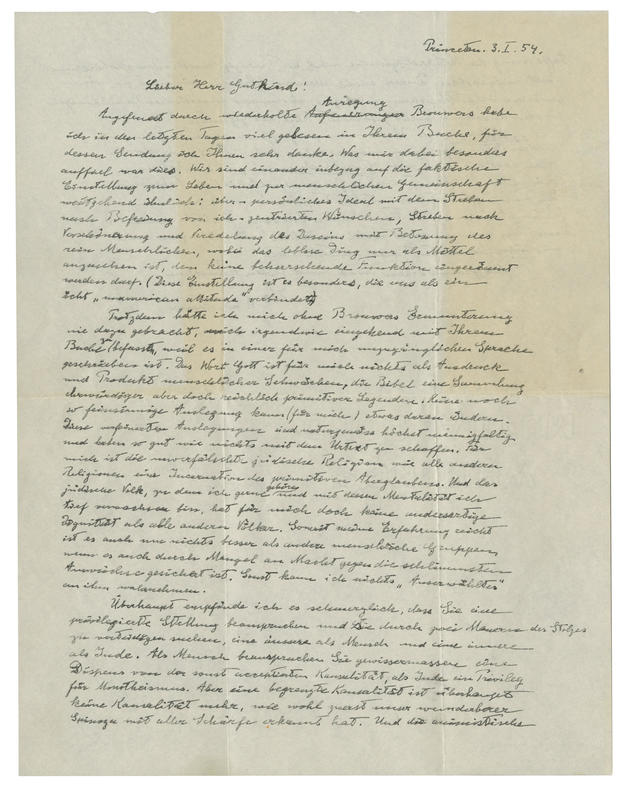NEW YORK — A 1954 letter written by Albert Einstein and known as the “God letter” because he discussed his thoughts about God, religion and his own Jewish faith has fetched close to $2.9 million at an auction in New York.
The letter, which was sold at Christie’s on Tuesday, was written the year before the Nobel prize-winning physicist’s death. It was addressed to philosopher Eric Gutkind, who had written a book about Jewish spirituality and the pursuit of science.
In the letter, Einstein declared, “The word God is for me nothing more than the expression and product of human weaknesses, the Bible a collection of honorable but still primitive legends.”

This undated photo provided by Christie’s shows the first page of Albert Einstein’s “God Letter,” dated January 3, 1954.in which he offers his candid and unvarnished opinion that: “The word God is for me nothing but the expression and product of human weaknesses, the Bible a collection of venerable but still rather primitive legends.” It is being auctioned by Christie’s on Dec. 4, 2018. (Christie’s via AP)
/ AP
Einstein was constantly questioned about his religious beliefs during his lifetime.
The letter had previously sold for $404,000 at Bloomsbury Auctions in London in 2008.
Christie’s books and manuscripts specialist Peter Klarnet said the letter is notable for its bluntness.
“Here he is actually quite blunt in what he says,” Klarnet said. “The word ‘God’ is a product of human weakness.”
The Reuters news agency points out Einstein “did not exclude Judaism, saying he admired and loved his
people, but that he did not believe they were chosen above others.”
“For me the Jewish religion like all other religions is an incarnation of the most childish superstition,” he wrote, adding “I cannot see anything ‘chosen’ about them.”
Walter Isaacson, the author of the 2007 biography “Einstein: His Life and Universe,” said the great man’s views on religion are hard to pin down.
“Einstein generally avoided giving simple answers, and like most human beings his feelings about spirituality varied over time,” Isaacson said. “Sometimes he expressed himself in more spiritual terms and sometimes he was more of a debunker of religion.”
As Isaacson recounts in the book, everyone from clerics to schoolchildren quizzed Einstein about his religious views. A New York rabbi sent a telegram demanding, “Do you believe in God? Stop. Answer paid. 50 words.” Einstein answered, “I believe in Spinoza’s God, who reveals himself in the lawful harmony of all that exists, but not in a God who concerns himself with the fate and the doings of mankind.”
Isaacson said it’s not surprising that Einstein’s faith or lack thereof sparked so much interest.
“There was a delightful belief that a genius who could fathom the laws of the universe could give us the answer to timeless questions such as about the existence of God,” Isaacson said. “And many people were hungering for a way to reconcile science and religion. They were hoping that he would say, ‘Yes, there is a God. You can quit worrying about it now.’ But his beliefs were not that simple.”
© 2018 CBS Interactive Inc. All Rights Reserved. This material may not be published, broadcast, rewritten, or redistributed. The Associated Press contributed to this report.

